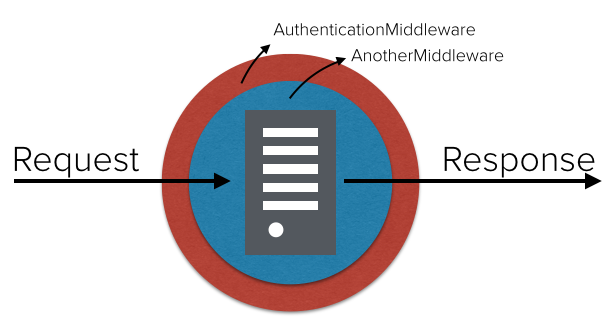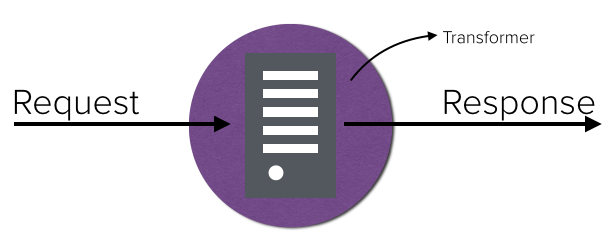Plugins
It’s possible to add functionalities to your APIs just by using plugins. ApiHub supports two type: Middleware and Transformer.
Middleware
Middleware is a wrapper around your API that decorates the requests without adding logic in the application. It’s supposed to run before dispatching the request to the API. It’s allowed to use as many middlewares as you want, since they implement the interface below:

type Middleware interface {
Configure(cfg string)
Serve(rw http.ResponseWriter, r *http.Request, next http.HandlerFunc)
}
Writting a Middleware
package middleware
import (
"encoding/json"
"net/http"
"github.com/rs/cors"
)
type Cors struct {
AllowedOrigins []string `json:"allowed_origins"`
AllowedMethods []string `json:"allowed_methods"`
AllowedHeaders []string `json:"allowed_headers"`
ExposedHeaders []string `json:"exposed_headers"`
AllowCredentials bool `json:"allow_credentials"`
MaxAge int `json:"max_age"`
Debug bool `json:"debug"`
}
func NewCorsMiddleware() Middleware {
return &Cors{}
}
func (c *Cors) Serve(rw http.ResponseWriter, r *http.Request, next http.HandlerFunc) {
cors := cors.New(cors.Options{
AllowedOrigins: c.AllowedOrigins,
AllowedMethods: c.AllowedMethods,
AllowedHeaders: c.AllowedHeaders,
ExposedHeaders: c.ExposedHeaders,
AllowCredentials: c.AllowCredentials,
MaxAge: c.MaxAge,
Debug: c.Debug,
})
cors.ServeHTTP(rw, r, next)
}
func (c *Cors) Configure(cfg string) {
json.Unmarshal([]byte(cfg), c)
}
After that, it’s needed to add the middleware to the Gateway:
gw.Middleware().Add("cors", NewCorsMiddleware)
The response:
HTTP/1.1 200 OK
access-control-allow-credentials: true
access-control-allow-methods: PUT
access-control-allow-origin: http://helloworld.apihub.dev
access-control-max-age: 10
vary: Origin
date: Sat, 16 May 2015 13:40:44 GMT
content-length: 0
content-type: text/plain; charset=utf-8
Connection: keep-alive
Using a Middleware
To use a Middleware, it’s needed to create a config for each service and it’s needed to use the name you used when adding it to the Gateway:
curl -XOPTIONS -H 'Access-Control-Request-Method: PUT' -H 'Origin: http://helloworld.apihub.dev' http://helloworld.apihub.dev/ -i
services := []*account.Service{&account.Service{Endpoint: "http://www.example.org", Subdomain: "example"}}
confCors := &account.Plugin{
Name: "cors",
Service: services[0].Subdomain,
Config: map[string]interface{}{"allowed_origins": []string{"http://helloworld.apihub.dev"}, "debug": true, "allowed_methods": []string{"DELETE", "PUT"}, "allow_credentials": true, "max_age": 10},
}
confCors.Save()
Transformer
Transformer is supposed to run after the API response, just before writing the final response.

type Filter func(*http.Request, *http.Response, *bytes.Buffer)
Writting a Transform
func FooTransformer(r *http.Request, w *http.Response, body *bytes.Buffer) {
w.Header.Set("Content-Type", "text/plain")
body.Reset()
body.Write([]byte("Foo"))
}
After that, it’s needed to add the transformer to the Gateway:
gateway.Transformer().Add("FooTransformer", FooTransformer)
Using a Transform
To use a Transformer, you just need to use the name you used when adding it to the Gateway:
services := []*account.Service{&account.Service{Endpoint: "http://www.example.org", Subdomain: "example",Transformers: []string{"FooTransformer"}}}
Updated less than a minute ago
